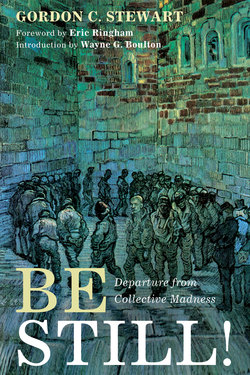Читать книгу Be Still! - Gordon C. Stewart - Страница 16
На сайте Литреса книга снята с продажи.
Our Anxious Time
ОглавлениеA toad can die of light!Death is the common right Of toads and men,—Of earl and midge The privilege.Why swagger then?The gnat’s supremacy Is large as thine.
—Emily Dickinson (1862)12
Ours is an anxious time, a fearful time, an insecure time. We feel it in our bellies.
Anxiety, fear, and insecurity were the subject of philosophical theologian Paul Tillich13 and philosopher of religion Willem Zuurdeeg,14 for whom the questions were passionate and all-consuming over their lifetimes. Even so, they were not the best of friends.
Zuurdeeg was a critic of Tillich’s attempts to create a philosophical-theological system. He saw every system as a flight from finitude and ambiguity into what he called an “Ordered World Home” that makes sense of, and defends against, the anxiety intrinsic to finitude. For Zuurdeeg, to be human is to be thrown into chaos, and every philosophy from Plato to Hegel to Tillich is “born of a cry”—the cry for help, for sense, for protection, for a security that lies beyond one’s powers.
But rereading Tillich’s Systematic Theology after perusing the morning news leads to the conclusion that Zuurdeeg and Tillich were very close, as is often the case between critics of one another. One thinks, for example, of Sigmund Freud and Carl Jung in a similar manner.
For all their differences, Zuurdeeg and Tillich were joined at the hip by their shared experience with madness in society and the demise of the once-trusted foundations of Western civilization. The rise of the German Third Reich led them to lifelong searches not only for answers but for the questions that might lead to insight into the existential situation that tilled the ground for the flowering of Hitler’s collective madness, which threw the world headlong into chaos and destruction.
Tillich distinguishes between anxiety and fear. Fear has an object. We fear an enemy. We fear Iran; Iran fears us. Israel fears the Palestinians; the Palestinians fear the Israelis. “Objects are feared,” said Tillich.
A danger, a pain, an enemy, may be feared, but fear can be conquered by action. Anxiety cannot, for no finite being can conquer its finitude. Anxiety is always present, although often it is latent. Therefore, it can become manifest at any moment, even in situations where nothing is to be feared . . . Anxiety is ontological; fear, psychological . . . Anxiety is the self-awareness of the finite self as finite.15
Anxiety is the self-awareness that we are mortal. We know a toad can die of light—death is the common right of toads and men—and that our supremacy is no greater than the gnat’s. We are excluded from an infinite, imperishable future. We were born, and we will die, and we know it. Despite every flight into denial, we know it in our bones. We have no secure space and no secure time. “To be finite is to be insecure.”16 In the face of this insecurity, said Zuurdeeg, the individual and the human species seek “to establish their existence” in time and space, though we know we cannot secure it. The threat we experience in the second decade of the twenty-first century is the threat of nothingness. Politicians pander to it. Some preachers pander to it. Advertisers prey on it. They and we eat anxiety for breakfast, lunch, and dinner.
Again, Tillich, writing as if for our time, “The desire for security becomes dominant in special periods and in special social and psychological situations. Men create systems of security in order to protect their space. But they can only repress their anxiety; they cannot banish it, for this anxiety anticipates the final ‘spacelessness’ which is implied in finitude.”17
I sip my coffee with Emily Dickinson aware of, and thankful for, this moment of finitude, determined that I will not turn over my anxiety to the hands of those who promise security from every fear. Emily, Willem, and Paul looked directly into the heart of human darkness and saw a light greater than the darkness, remembering that a toad can die of too much light! I want to live by the light of such humility, courage, and wisdom.
12. Dickinson, “A toad can die of light!”
13. Born and raised in Germany, Paul Johannes Tillich (1886–1965) was the first professor dismissed from his teaching position in 1933 for his outspoken criticism of the Nazi movement. At the invitation of Reinhold Niebuhr, he and his family moved to New York where Tillich joined the faculty of Union Theological Seminary.
14. Born and raised in the Netherlands in a family that served as part of the underground resistance to Hitler’s pogrom, Willem Frederik Zuurdeeg (1906–1963) spent his life asking how Western civilization’s most sophisticated culture (Germany), could fall so easily into the hands of a madman.
15. Tillich, Systematic Theology, 1:191–92.
16. Ibid., 195.
17. Ibid.
